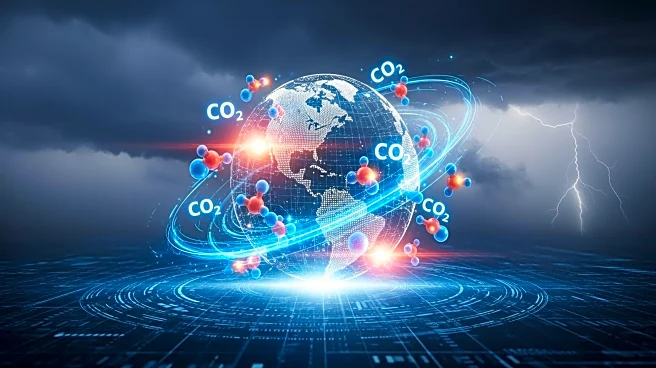What's Happening?
The World Meteorological Organization (WMO) has reported that carbon dioxide levels in the atmosphere have reached unprecedented highs, potentially exacerbating global warming and leading to more extreme
climate events. The report highlights a significant increase in CO2 concentration from 2023 to 2024, marking the largest rise since modern measurements began in 1957. This surge is attributed to the burning of fossil fuels and increased wildfires, particularly in South America. The report emphasizes the urgent need for emission reductions to mitigate these effects. Additionally, concentrations of other greenhouse gases, such as methane and nitrous oxide, have also reached record levels, further contributing to climate change.
Why It's Important?
The rise in CO2 levels and other greenhouse gases is a critical concern for global climate stability. These gases trap heat in the atmosphere, intensifying climate change and leading to more frequent and severe weather events. The WMO's findings underscore the diminishing capacity of natural carbon sinks, such as forests and oceans, to absorb emissions, which could exacerbate the situation. This development poses significant challenges for policymakers, environmentalists, and industries reliant on stable climate conditions. The potential impacts include increased natural disasters, disruptions to agriculture, and economic instability, highlighting the need for immediate and effective climate action.
What's Next?
The report precedes the upcoming United Nations Climate Change Conference in Brazil, where global leaders are expected to discuss strategies for reducing emissions and enhancing climate resilience. The findings may prompt renewed commitments to international climate agreements and inspire new policies aimed at curbing greenhouse gas emissions. Stakeholders, including governments, businesses, and civil society groups, are likely to face pressure to implement sustainable practices and invest in technologies that reduce carbon footprints. The conference could serve as a platform for collaborative efforts to address the urgent climate challenges highlighted by the WMO.
Beyond the Headlines
The WMO's report raises ethical and cultural questions about humanity's responsibility to protect the environment for future generations. It also highlights the long-term shifts in global climate patterns that could result from unchecked emissions. The stress on natural systems, such as the Amazon rainforest, underscores the interconnectedness of ecological health and climate stability. This situation may lead to increased advocacy for conservation efforts and a reevaluation of economic models that prioritize short-term gains over environmental sustainability.









